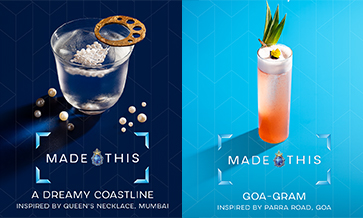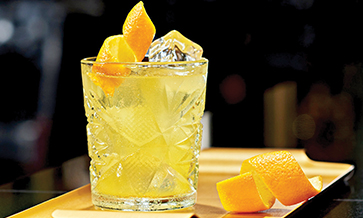More than 20 bartenders from different outlets in New Delhi recently gathered for a visit to Siqera, situated in nearby Manesar, Haryana. This was the first-of-its-kind consumer experience organised by team Siqera.
The brand is a brainchild of three youngsters: Rishi Dhawan, Amar Srivastava and Amit Berwal. Amit and Rishi have been classmates in Singapore; Amit and Amar had known each other when they were working on a project with a brewpub in Bengaluru.
The inception of Siqera happened over a cup of coffee. The entrepreneurs in them and destiny brought the three together for a common goal of starting a craft cidery.
Rishi says that research on the origin of cider took them back to ancient times. It turns out in the Bible (New Testament) that any alcoholic beverage made from fruits (other than grapes) in those days was commonly termed as Sikera. That’s where the name ‘Siqera’ came from.
What’s cider?
Cider is technically a wine, a product of fermented fruit (apple) juice. Just as wine grapes are different from table grapes, cider apples are more fibrous than sweet dessert apples. The later also lacks balance of sugar, acids and tannins. A winery which produces cider is called a cidery.
But why did the trio choose cider? “We wanted to bring good ciders to the mainstream. No doubt many brewpubs and micro-breweries across the nation are doing ciders, but their focus is beer and not cider,” said Amar.
The trio recognised this gap and thought to bridge it. Cider as a refreshing thirst-quenching drink fits perfectly into the Indian palate and hot climate – but it is not just a summer drink.
Amar notes that some wineries in Himachal Pradesh manufacture undrinkable and synthetic tasting ciders, bringing bad reputation to cider as a drink category. “I think this is the primary reason why no cider brands – even imported ones – have been able to create even a niche market in India,” he adds.
Production process
At Siqera, the cider making process is straightforward: apple juice concentrate is blended with water in fermentation tanks to the required concentration. The year 2019 saw a poor apple harvest in India both in terms of quality and quantity.
The inconsistent quality of Indian apples has been the primary driver for team Siqera to use imported apple concentrate juice to produce consistent quality cider without any worries.
The other important ingredient (80%) in Siqera cider is water. At the cidery, water is taken seriously: a purification plant sterilises the water and demineralises it before it is mixed with apple concentrate.
A sand filter removes any solid particles; an activated carbon filter removes biological matter, smell/odour, chlorine, etc.; and a reverse osmosis system takes away all minerals and microbes.
Yeast nutrients, such as calcium chloride or calcium phosphate, are added to water before it is mixed with apple concentrate to required concentration; this will be important for yeast survival and healthy fermentation.
The yeast is then pitched in juice to kick-start fermentation. A champagne yeast species, Saccharomyces Bayanus from Lalvin, is selected as it ferments to a much drier and neutral flavour profile. Such yeast allows the apple’s characteristics to shine through.
Slow maturation
Fermentation temperature is maintained at 18-20 degree Celsius. The cidery has two 2,000-litre and two 4,000-litre fermenters. “Our tanks are not sleek or conical. We have designed the tanks slightly wider than normal to increase the oxygen availability to yeast and reduce incidents of stuck fermentation,” Amar says.
Carbon dioxide produced during fermentation is trapped to optimal pressure as required. Post fermentation, cider is matured and clarified in horizontal stainless steel tanks at 4 degrees Celsius.
The larger surface area of cider is exposed to oxygen in the tanks accelerating maturation. The cider get rids of unwanted aromas and flavours. This stage also downplays any harsh astringency and acidity, and allows the CO2 to dissolve more uniformly in the cider.
Cider is then filtered to chuck out any unwanted particles, yeast and other micro-organisms. This is followed by blending and back-sweeting (sweet apple juice) and bottling. All bottles are then pasteurised and packed in packs of 12 per case.
“We have designed the pasteuriser in-house and you might not get to see such assembly in any brewery or cidery in India,” mentions Amar. Pasteurisation mildly strips down the fruit flavours, but it is necessary to enhance shelf life and mitigate the incidents of any accidental fermentation which can lead to pressure build-up inside the bottle.
The final product takes about 25 days to manufacture. The difference between the unfinished and finished product was quite evident – the tank sample of a cider undergoing fermentation was hazy, slightly sweet with yeasty and sulphur notes on the nose and palate.
The apple cider on tap had bright golden colour, with mouthful of apple flavours and balanced tannins. It is a balanced product, it is easy drinking, but comes with a note of caution: ‘I am 9% ABV’.
Mangoes too!
The second variant is the cider infused with Alphonso mangoes. “All of us have at least one childhood story relating to mangoes. We all are emotionally connected to this king of fruits,” Amar notes. One cannot but nod in agreement, don’t you?
Mango cider is slightly sweeter but subtle and balanced – the mango flavour does not overwhelm apple in cider. Mango cider production takes a week longer as it involves a secondary fermentation, where fresh mango pulp is infused with finished cider in a pressurized tank.
This allows the mango and apple flavours to remain intact. At this stage, cider undergoes enzyme treatment to remove any mango fibre. If untreated, it will leave mango cider thick and hazy.
The ciders are also supplied in 20-litre kegs on demand. Siqera can bottle up to 300 cases in a single day. The overall packaging is very tastefully done. Both the cider variants are currently available in Gurugram (Haryana) at Rs.200 for a 330-ml pint.
Visitors were treated with unlimited supply of ciders on tap, in-house bakery delicacies and delicious biryani. The chocolate cake with cider-soaked strawberries was the ultimate icing on the cake.
What is more, Siqera is currently working on two more exciting cider variants!
The trip was curated by Karina Agrawal, a social media influencer and beverage consultant. The Siqera cidery has a permit to host tastings and sell premium bottled ciders. If you would like to visit the cidery, write to cheers@siqera.com.














